暑假专题——七年级常考近义词或词组辨析(一)同步练习[1]
七年级语文易混近义词辨析

七年级语文易混近义词辨析推荐文章语文必考的近义词和反义词热度:小学语文的近义词大全热度:小学语文必考的近义词和反义词热度:四年级语文下册近义词大全_四年级语文下册知识点归纳热度:七年级语文复习常用近义词热度:【过度过渡】“过度”是形容词,指超过了适当的限度。
“过渡”是动词,指事物由一个阶段逐渐地转入另一个阶段。
【关心关切关怀】“关心”泛指常挂在心上,重视,注意,对象较广,对人对物都可用。
“关怀”不仅是关心,而且是爱抚,多用于上对下。
“关切”比“关心”更进一层,含亲切意味,多用于别人对自己,有时也用于对别人、对事物。
【诡辩狡辩】“诡辩”指常以欺诈的言辞迷惑人,以达到为自己辩解的目的。
“狡辩”指理屈词穷,强词夺理进行辩解。
【互相相互】“互相”是副词,作状语,如:互相尊重。
“相互”是副词,可作状语,又可作定语,如:相互关系。
近义词平淡——平常困顿——贫困固执——顽固喜欢——喜爱福利——利益保障——保证幽芳——芬芳希罕——珍惜欺凌——欺压分外——格外慈祥——和蔼传递——传送诞生——产生获取——获得重复——反复准确——精确汇集——聚集率领——带领爆发——爆出宣告——宣布庄严——严肃鼓励——鼓舞雄伟——宏伟陆续——继续标明——表示次序——顺序顷刻——霎时激昂——高昂眷恋——留恋幽芳——芬芳希罕——珍惜欺凌——欺压分外——格外慈祥——和蔼传递——传送诞生——产生获取——获得寻常——平常迅速——快速预想——预料偶然——偶尔褒奖——夸奖1 近义词:飘荡(飘动)、凉爽(凉快)、环绕(围绕)、尽情(纵情)2 近义词:解释(说明、解说)、理解(懂得、了解)、旅游(旅行、远足)4 近义词:发现(发觉)、飘零(飘落)、奉献(贡献)、回归(回来)、肥美(肥壮、肥沃)、葱翠(青翠)、茁壮(强壮、健壮)反义词:5 近义词:映照(映射、照耀)、挺拔(挺立、苍劲)、赞美(赞扬、歌颂)、透明(透亮、晶莹)6 近义词:宛如(犹如、好像)、一般(一样、普通)7 近义词:映衬(衬托)、神往(向往)、越发(更加)、雄伟(雄壮)、纯净(纯洁)、壮丽(壮美)、明洁(明净)8 近义词:装点(装饰)、嘱咐(叮嘱)、宝贝(珍宝)、迷惑(困惑)9 近义词:拜访(拜望、访问)、憨厚(忠厚、老实)、神秘(神奇、奇怪)、保存(储存、积存)10 近义词:摇晃(摇动、摇摆)、机灵(机警、机智)、察看(观察、视察)、随即(立即、立刻)11 近义词:招集(召集、聚集)、抵抗(抗击、抵抗)、侵略(入侵、侵犯)、战斗(斗争、奋战)12 近义词:征服(降伏、制服)、免除(免去、免掉)、屈辱(耻辱、侮辱)13 近义词:异常(非常、特别)、效果(成效、效验)14 近义词:观赏(欣赏、观看)、聚集(集合、聚拢)、璀璨(灿烂)、闪耀(闪烁)、精彩(出色)、舒服(舒适、畅快)、五颜六色(五光十色)、举世闻名(文明遐迩)15 近义词:黎明(清晨、拂晓)、俊俏(俊秀、俏丽)、格外(分外、特别)、出现(显现、涌现)、光彩(光荣)、告别(辞别、辞行)、生机勃勃(朝气蓬勃)16近义词;活泼(活跃、灵活)、甜津津(甜丝丝)、成熟(老练、老成)、热闹(繁华、红火)17 近义词:奇怪(古怪、奇异)、刨根问低(追根究底)、聚精会神(全神贯注)18近义词:警觉(警惕)、欺负(欺压、欺侮)、激烈(剧烈、猛烈)、洪亮(响亮)、倒霉(倒运、背时)、气势汹汹(威风凛凛)19近义词:维修(修理、修整)、呼啸(咆哮)、释放(开释、保释)、巨大(庞大、宏大)、得意(满意、高兴)20 近义词:镇定(镇静、稳定)、恳切(诚恳、关切)、了不起(了不得)、损伤(伤害、受害)、忍受(忍耐、承受)、担心(担忧、忧虑)、苍白(惨白、灰白)、平静(安静、宁静)、勉强(将就、凑合)21近义词:愿意(情愿、乐意)、犹豫(犹疑、迟疑)、忧郁(愁闷)、结束(终止、完结)、困境(逆境)、轮流(轮番、轮换)、热烈(烈火、热闹)、情况(情形、状况)、珍惜(珍爱、珍视)22 近义词:失望(扫兴、绝望)、娇艳(鲜艳、艳丽)、甘心(情愿、甘愿)、培育(培养、哺育)、附近(邻近、周边)、扫兴(败兴、失望)、梦想(妄想、渴望)23 近义词:情景(情形、景象)、欢聚(团聚)、思念(想念、怀念)、兴高采烈(兴致勃勃)24 近义词:空闲(闲暇、休闲)、陋习(陋俗)、废除(废止、取消)、残害(伤害、杀害)、痛苦(痛楚、困苦)、喜欢(喜爱)、生气(动气、发怒)、笑话(见笑、讥笑)。
初一常见近义词辨析

初一常见近义词辨析1、包含——包涵辨析:“包含”,包容含有,多用于抽象的事物,如“包含着丰富的感情”,“包含着殷切的希望”;“包涵”,请人原谅的礼貌用语,如“招待不周,多多包涵”。
2、本义——本意辨析:“本义”,文字学用语,和引申义相对应,如“天的本义指头”;“本意”,原始的想法,最初的出发点,如“我的本意是为公司留住人才”。
在实际语言运用中,强调本意往往是因为本意未被认识或理解。
3、必须——必需辨析:两者的侧重点不同。
“必须”强调的是“一定得要”,非做不可,有强制、命令的口气,如“你必须一起去”;“必需”强调的是“一定得有”,少了不行,如“这是孩子必需的生活用品”。
前者和动词搭配,后者和名词搭配。
4、不齿——不耻辨析:“不齿”,不愿提及,不以为伍,在感情上表示极大的蔑视,如“一味逢迎的做法为人所不齿”。
“不耻”的意义与之相反,是不以为耻,如“要真正学一点东西一定要做到不耻下问”。
5、不以为然——不以为意辨析:然,正确的意思。
“不以为然”,即对别人的观点持否定的态度,不以为是正确,含轻视的意思,如“他对班长的意见不以为然”,“他嘴上虽然没有说对,心里却不以为然”。
“不以为意”是不当一回事,不放在心上,如“他对医生的劝告不以为意”。
前者是不同意,后者是不重视。
6、不孚众望——不负众望辨析:孚,使人信服。
“不孚众望”即和众人的期望不相称,无法使人信服。
负,辜负、违背。
“不负众望”即没有辜负众人的期望。
前者是失望,后者是喝彩,两词的意义正好相反。
7、沉醉——沉湎辨析:两者都指沉于酒。
“沉醉”是中性词,强调的是醉态,比喻享受的程度,如“沉醉于眼前的美景”;“沉湎”是贬义词,多用于形容一种不良的生活习惯,如“沉湎于网络游戏”。
8、出身——出生辨析:“出身”的“身”指身份,她和一种特定的背景相联系,如“他出身于工人家庭”,“他是教师出生”;“出生”的“生”是指诞生,即胎儿从母体中诞生出来的过程,如“他出生于上海”,“他一出生便给全家带来欢乐”。
近义词组辨析
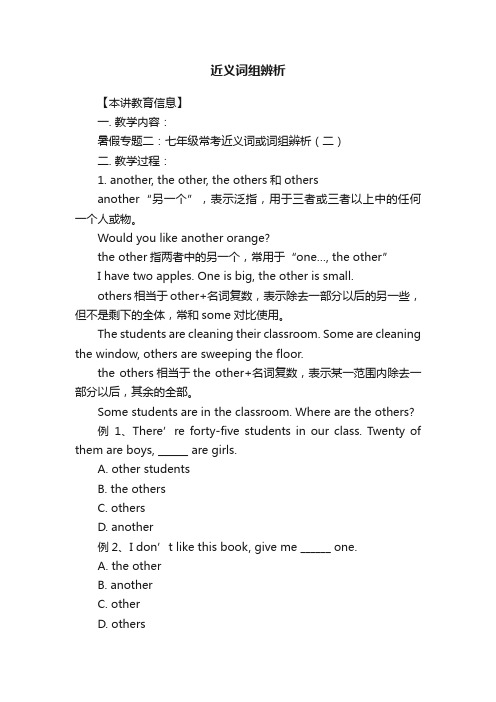
近义词组辨析【本讲教育信息】一. 教学内容:暑假专题二:七年级常考近义词或词组辨析(二)二. 教学过程:1. another, the other, the others和othersanother“另一个”,表示泛指,用于三者或三者以上中的任何一个人或物。
Would you like another orange?the other指两者中的另一个,常用于“one…, the other”I have two apples. One is big, the other is small.others相当于other+名词复数,表示除去一部分以后的另一些,但不是剩下的全体,常和some对比使用。
The students are cleaning their classroom. Some are cleaning the window, others are sweeping the floor.the others相当于the other+名词复数,表示某一范围内除去一部分以后,其余的全部。
Some students are in the classroom. Where are the others?例1、There’re forty-five students in our class. Twenty of them are boys, ______ are girls.A. other studentsB. the othersC. othersD. another例2、I don’t like this book, give me ______ one.A. the otherB. anotherC. otherD. others2. too many, too much和much tootoo many 太多……,修饰可数名词复数。
There’re too many rules in our school. I can’t stand them.too much太多……修饰不可数名词,也可以作副词使用。
初中语文常考40个“近义词辨析”

初中语文40个常考“近义词辨析”1. 履行、执行【同】都是动词,都有按规定去做的意思。
【异】“履行”侧重指按事先约定的或规定的去实行,表示“实践(自己答应做的或应该的做的事)”的意思,适用范围较小,搭配对象较少,对象常是带约束性的事物,或双方或多方约定的,如条约、契约、协定、协议、合同、诺言、义务等,通用于书面语和口语,而较多用于书面语。
“执行”侧重指按规定去实行,带有强制性,表示“实施;实行(政策、法律、计划、命令、判决中规定的事项)”的意思,适用范围较大,适用对象萧广,常是上级规定必须做的事情,如命令、任务、法令、判决、纲领、政策、路线、方针、计划、决议、原则、纪律等,通用于书面语和口语。
2. 嘲笑、讥笑、讪笑【同】都是动词,都是并列式的合成词,都有“因看不起而取笑别人”的意思,都含贬义。
近义词有“嘲讽”“嗤笑”“讥讽”“讥刺”等。
【异】“嘲笑”意思是“用言辞笑话对方”,有“戏弄”的意味,侧重于“对对方言行的否定”,语意较轻,适用范围广,既可用于别人,也可用于自己。
常用于口语,也可用于书面语。
“讥笑”有“讥讽和嘲笑”之意,侧重于“讽刺、挖苦”,在感情色彩上更带有轻蔑意味,语意比“嘲笑”更为尖刻,适用范围比“嘲笑”窄些,它只能用于对方,常见于书面语,也可用于口语。
“讪笑”就是“讥笑”之意,侧重于“戏弄”,适用范围比“嘲笑”“讥笑”窄,仅用于书面语。
3. 美丽、漂亮【同】都是形容词,都是并列式的合成词,都表示“人或物好看,令人赏心悦目”的意思,都是褒义词,多用于口语,也可用于书面语。
近义词有“好看”“俊俏”“潇洒”“秀丽”“美观”等。
【异】“美丽”着重指“使人看了产生快感的;好看”之意,修辞的对象常常是女性、风光、景物等。
“漂亮”着重指“好看、美观;出色”的意思,修辞的对象男女均可,还可用于动物、服饰、用具、建筑物等。
另外,“美丽”有“美好、高尚”的意思,而“漂亮”没有;“漂亮”有“表面好看但不能兑现的东西”之意,而“美丽”没有。
七年级暑假专题 词语的语义 试题

七年级语文暑假专题词语的语义[学习过程]一、词语的理性义:表示事物的特点或者内容的。
如:猹,野兽,像獾,喜欢吃瓜。
船,水上的主要的运输工具。
词语的理性义细分还有三种:1、根本义:是最初的或者者常用的语义。
2、引申义:从根本义引申出来的。
3、比喻义:是通过用根本义来比喻另外的事物而固定下来的语义。
如:海根本义:大洋靠近陆地的局部。
如东海、大海、海洋引申义:大的。
如海量、海碗。
比喻义:比喻连成一大片的很多同类事物。
如人海、火海、林海。
如:牛根本义:哺乳动物,身体大,趾端有蹄,头上长有一对角,尾巴尖端有长毛是反刍类动物,力气大,供役使、乳用或者乳肉两用,皮、毛、骨等都有用途。
如黄牛、水牛、牦牛。
比喻义:比喻固执或者骄傲。
如牛气、牛脾气。
如:包袱根本义:包衣服等东西用的布。
比喻义:比喻影响思想或者行动的负担。
给词语中的“亮〞选择正确的义项:二、词语的感情色彩义:指带有表示说话人对相关事物的爱憎、褒贬。
如:褒义词:英雄、老实、英勇、美丽、果断、成果贬义词:叛徒、虚伪、鲁莽、妖媚、武断、后果中性词:结果、缓慢在特定情况下有时词语的感情色彩会发生变化,如:我喜欢海,溺爱着海。
——?听潮?贬——褒我如今想想,那时真是太聪明了。
——?背影?褒——贬我用儿童的狡猾的目光发觉,她爱我们。
——?我的教师?贬——褒三、词语的语体色彩义:附带有表示口语语体或者书面语语体的色彩。
1、口语色彩:瞧、瞅、惦记、压根儿、昨儿2、书面语色彩:观察、视、思念、从来、昨天3、通用语色彩:看、想念、身体、痛快注意:语体色彩是否得体,要看是在什么情况下,不同的情况,有时对语体的色彩要求是不同的。
例如:“在驱逐HYHY之后,进展了三年的人民解放战争,获得了根本的成功。
〞“赶跑了HY鬼子之后又打老蒋,打了三年,这仗差不多打赢了。
〞这两句哪一个更得体,要看用在什么地方。
假如是撰写政治理论文章,应该用第一句,具有严肃性的特点。
又如:“爷爷,您年纪大了,下肢又不得力,走路要慎重。
人教版七上近义词辨析.doc
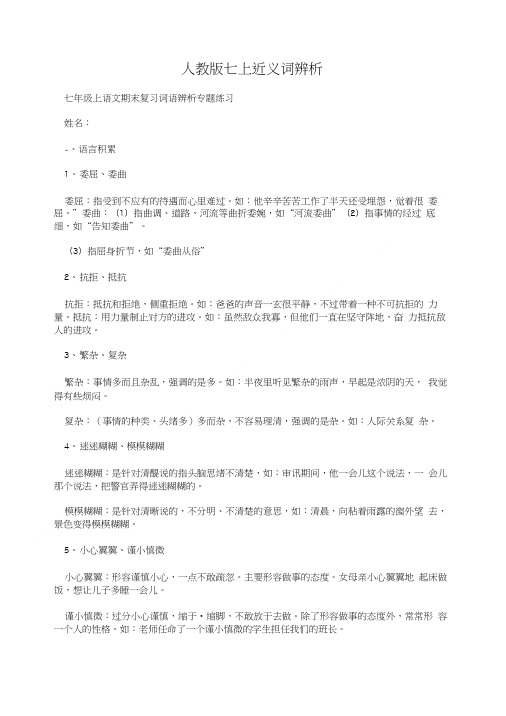
人教版七上近义词辨析七年级上语文期末复习词语辨析专题练习姓名:-、语言积累1、委屈、委曲委屈:指受到不应有的待遇而心里难过。
如:他辛辛苦苦工作了半天还受埋怨,觉着很委屈。
”委曲:(1)指曲调、道路、河流等曲折委婉,如“河流委曲”(2)指事情的经过底细,如“告知委曲”。
(3)指屈身折节,如“委曲从俗”2、抗拒、抵抗抗拒:抵抗和拒绝,侧重拒绝。
如:爸爸的声音一玄很平静,不过带着一种不可抗拒的力量。
抵抗:用力量制止对方的进攻。
如:虽然敌众我寡,但他们一直在坚守阵地,奋力抵抗敌人的进攻。
3、繁杂、复杂繁杂:事情多而且杂乱,强调的是多。
如:半夜里听见繁杂的雨声,早起是浓阴的天,我觉得有些烦闷。
复杂:(事情的种类、头绪多)多而杂,不容易理清,强调的是杂。
如:人际关系复杂。
4、迷迷糊糊、模模糊糊迷迷糊糊:是针对清醍说的指头脑思绪不清楚,如:审讯期间,他一会儿这个说法,一会儿那个说法,把警官弄得迷迷糊糊的。
模模糊糊:是针对清晰说的,不分明、不清楚的意思,如:清晨,向粘着雨露的窗外望去,景色变得模模糊糊。
5、小心翼翼、谨小慎微小心翼翼:形容谨慎小心,一点不敢疏忽。
主要形容做事的态度。
女母亲小心翼翼地起床做饭,想让儿子多睡一会儿。
谨小慎微:过分小心谨慎,缩于•缩脚,不敢放于去做。
除了形容做事的态度外,常常形容一个人的性格。
如:老师任命了一个谨小慎微的学生担任我们的班长。
6、瞭亮、洪亮、响亮瞭亮:声音清晰响亮,一般只形容歌声、号声、喇叭声、鸡叫声。
如:牛背上牧童的短笛这时候也成天噪亮的响着。
洪亮:声音人而响亮。
多形容嗓咅。
响売:声音宏人,如:他冋答的很响亮。
7、安适、安闲、安逸安适:安静而舒适。
重在“适”,舒适,如:一个老城,暖和安适的睡着。
安闲:安静清闲,重在“闲”,心中无牵挂。
女山他忙里忙外,一日不得安闲。
安逸:安闲舒适,重在“逸”,个人的安乐,如:老人晚年在乡下过着安逸的生活。
8、须臾,瞬间须臾:作为书面语表示时间极短。
初中语文:常考近义词辨析汇总

初中语⽂:常考近义词辨析汇总说明:1. 此表按近义词组中相同语素的⾳序编排2. 若⽆相同语素,则按照近义词组中相同的⾳素编排。
3. 若⽆相同⾳素,则按照近义词组中相近的⾳素编排。
A1. 安置/安顿安置:着重指使⼯作、⽣活等有适当的位置。
多是处理⼈事⼯作的活动。
安顿:着重指安排妥当,使有确实的着落。
B1. 包含/包涵包含:包容含有。
包涵:原谅、宽恕。
2. 不齿/不耻不齿:不愿意提到表⽰极端鄙视。
不耻:不顾羞耻不以为有失体⾯;不以为耻。
3. 本义/本意本义:词的本来意义,与引申义、⽐喻义相对。
本意:⼼⾥本来的想法、⽬的。
4. 必须/必需必须:副词,后跟动词,表⽰“⼀定要”。
必需:动词,“⼀定要有”;①可作谓语,如“阵地战也必需”;②多作定语,如“必需的素质”,后跟名词或名词性的短语。
5. 编辑/编撰/编篓编辑:主要指对资料或现成的作品进⾏整理加⼯。
编撰:编纂、编写。
编纂:编写(多指资料、篇幅较⼤的著作)。
6. 变换/变幻变换:指事物的⼀种形式和内容转换成另⼀种。
变幻:后者指不规则的改变(多指抽象、概括性事物)。
7. 辨正/辨证/辩证辨正:辨明是⾮,纠正谬误。
如“辨正发⾳”,可写作“辩正”。
辨证:辨析考证,如“经学者多⽅辨证”。
亦为中医术语,“辨证医治”。
辩证:哲学术语,如“辩证唯物主义”。
亦同“辨证”第⼀义。
8. 申辩/声辩申辩:申诉理由,加以辩解声辩:公开辩解。
9. 个别/各别个别:单个,极少数。
如“个别现象”、“个别处理”。
各别:各不相同,有分别或特别。
如“各别对待”、“形式各别”。
10. 甄别/鉴别甄别:审查辨别;考核鉴别。
鉴别:通过仔细观察加以辨别。
11. 鉴别/辨别鉴别:侧重于从实际上审定真伪与好坏,使⽤范围较⼩,多指具体事物。
辨别:则是根据不同事物的特点,在认识上加以区别,可指具体事物,也可指抽象事物12. 不⼒/不利不⼒:不尽⼒。
如“措施不⼒”。
不利:没好处,不顺利,如“出师不利”。
13. 不⽌/不只不⽌:表⽰数量茫围超出。
常见的近义成语辨析和训练100题

常见的近义词语辨析与练习100题1.把戏/伎俩把戏:花招。
伎俩:不正当的手段。
后者贬义性质更重。
他一眼就识破了这骗人的________。
2.颁布/公布颁布:着重指向下颁发。
公布:着重指向公众发布。
《未成年人保护法》已经________多年了,但对未成年人的权益维护还很不如人意。
3.爆发/暴发爆发:作忽然发作讲时,多指人为的大的抽象的现象或情况,如力量情绪事变等忽然发作或发生。
另外,还可特指火山爆发。
暴发:突然发财或得势,多含贬义,如暴发户;突然发作,多指自然具体的现象或事物突然发作,如洪水暴发。
近年来,成都、南京、西安、武汉等许多大城市相继________报业大战,令广大读者大受其益。
4.卑劣/卑鄙卑劣:卑鄙而恶劣,程度重。
卑鄙:言行恶劣,不道德。
台湾当局分裂祖国的________行径,必将受到历史的惩罚。
5.必需/必须必需:一定要有的,不可缺少的,相当于一个形容词,一般用于修饰名词,作定语。
必须:表示事理情理上的必要、一定要,或用于加强命令语气。
出发前个人要准备好生活________品。
6.辨证/辩证/辨正辨证:辨析考证。
辩证:形容看问题的眼光全面。
辨正:判断是非、正确错误。
经专家多方________,这块石料就是有名的青田石中的鸡血石。
7.不齿/不耻不齿:不愿意提到,表示鄙视。
不耻:不顾羞耻,不以为有失体面。
图书市场上部分作品从内容、写作手法到包装、宣传都极力媚俗,为文学界乃至许多读者所________。
8.裁决/裁定裁决:强调程序的最后一个环节。
裁定:斟酌决定其去取可否。
上周,学校的校务委员会对这个问题作了最终的________。
9.抽象/概括抽象:指从许多事物中,舍弃个别的、非本质的属性,抽出共同的、本质的属性。
概括:指把事物的共同特点归结在一起。
价值最初是在商品交换中________出来的一个经济学概念。
10.出席/列席出席:正式代表。
列席:非正式代表。
李先生________了这次大会,并做了精彩的发言。
中学阶段常考近义词辨析

中学阶段常考近义词辨析心里:胸口内部,头脑里。
心理:内心活动,大脑反映客观现实的过程。
学说:学术上系统的见解、主张。
学术:有系统的、较专门的学问。
威慑:用武力使对方感到恐惧。
威慑力量。
震慑:震动使害怕。
震慑敌人。
启事:向群众说明事件的文字(名词)。
启示:对人加以指点使认识到某些事物(动词)。
充满:布满;充分具有。
充斥:充满(含厌恶意、贬义)。
截止:(到一定期限)停止。
报名在昨天已经截止。
截至:截止到(某个时候)。
报名日期截至本月底止。
附和:(言语、行动)追随别人(多含贬义)。
赞同:赞成,同意(中性词)。
爱戴:敬爱并且拥护。
拥戴:拥护推戴(某人做领袖)。
过渡:事物由一个阶段(状态)逐渐发展变化而转入另一个阶段(状态)。
过度:超过适当的限度。
表率:好榜样。
楷模:榜样、模范(色彩庄重一些)。
原形:原来的形状;本来面目(贬义)。
原形毕露。
原型:文学作品中塑造人物形象所依据的现实生活中的人。
游览:从容行走观看(名胜、风景)。
游历:到远地游览。
逐步:一步一步地,人为能动的安排。
逐渐:渐渐地,强调渐变状态。
权力:政治上的强制力量。
权利:依法行使的权力,享受的利益。
起用:重新任用。
对人而言。
启用:开始使用,对物而言。
法制:法律制度。
法治:以法为准则,治理国家、人民。
必需:一定要有、必不可少。
强调需要。
必须:事理上一定要,不容置疑。
敦促:诚恳地催促。
督促:监督、催促。
标明:做出记号、写出文字使人知道。
表明:表示清楚。
熟悉:知道得清楚。
我熟悉他。
熟习:(对某种技术或学问)学习得很熟练或了解得很深刻。
熟习业务。
鄙弃:看不起、厌恶。
鄙视:轻视,看不起。
考察:实地观察、调查。
考查:用一定的标准来检查、衡量。
局面:一个时期内事情的状态。
局势:指政治、军事等一个时期内发展情况。
时事:最近期间国内外大事。
时势:某一时期客观形势。
期望:希望,期待(只能用于他人)。
希望:心里想着达到某种目的(既可以用于自己,亦可用于他人。
)攀附:投靠有权势的人(贬义)。
七年级英语暑假衔接---名词词义辧析预习知识与例题分析

20、The railway system __________ depended on the plan used in other countries.(success) 【答案】successful 【解析】句意:这个铁路系统是依照其他国家所使用的已 成功的计划制定的。分析句子结构可知此处需用形容词 successful 修 饰 plan , 所 以 需 把 名 词 success 变 为 形 容 词 successful。故填successful。
8、Drivers should drive more slowly on ______ days.(rain) 【答案】rainy 【解析】句意:司机应该在下雨天开得更慢。根据空格后 days可知,空格处应该填形容词,故填rainy。
9、The skirt is very _________, and Lucy really likes it. (beauty) 【答案】beautiful 【解析】句意:这件裙子非常漂亮,露西真的很喜欢它。 分析句子成分可知此处需填形容词作表语,故填beautiful。
6、March 8th is _________ Day. (woman) 【答案】Women’s 【解析】句意:3月8日是妇女节。Women’s Day意为“妇女 节”,用woman的复数所有格,并且节日要为专有名词,首 字母应大写。故填Women’s。
7 、 There are some _______ and pens on Wang Jun’s desk.(knife) 【答案】knives 【解析】句意:在王军的桌子上有几把刀子和几支钢笔。 根据空前some可知此处需填可数名词复数或不可数名词。 故填knives。
念较大;game意思是“运动、比赛”,不管户内户外还是脑力体力,指以胜负为主 的运动;match意为“竞赛、比赛”,多指正式比赛;race主要表示“赛跑、赛马、赛 车”。
初中语文-常见常用近义词辨析(一)

初中语文-常见常用近义词辨析(一)暧昧:含糊、不明朗,不光明磊落,不便告人。
暗昧:同暧昧。
还可表示不聪明,愚昧。
哀号:悲哀的号哭。
哀嚎:悲哀的嚎叫。
如饿狼哀嚎。
爱好:顾惜体面,喜欢打扮。
爱好:喜爱,对某种事物具有浓厚的兴趣。
爱怜:怜爱。
爱恋:热爱而难以分离(多指男女之间)。
安定:生活形势等平静正常,稳定。
生活安定。
安宁:秩序正常,没有骚扰。
边境安宁。
安谧:安宁,安静。
主要指环境气氛。
安静:没有声音,安稳平静。
平静:着重指平稳,没有不安与动荡。
常形容心情、表情、势态等。
清静:着重指不嘈杂、不杂乱。
安顿:安稳。
使人或事物有着落,着重指安排妥当,使有确实的着落。
安放:使物件处于一定的位置,是具体的动作。
安置:使人或事物有着落。
着重指使工作、生活等有适当的位置。
多是处理人事工作的活动。
安排:着重于分清先后、主次、轻重缓急、有条有理地处理人和事。
多指工作上的处理活动。
安全:都指没有事故或危险。
安全:着重指不受威胁。
使用范围广,能用于国家、生产、交通、操作、人身、生命、财产等。
平安:着重指太平无事,使用范围较窄,多用于人身。
按照:同为介词。
介绍行为的根据。
按照:通用于各种语体,不带尊敬色彩。
依照:多用于书面语体,更适用于国家法规、军政文告等,这时是强调依原样照办,不得走样。
遵照:多用于书面语。
带尊敬色彩,表示遵从依照。
懊悔:形容词。
因未满足心愿而悔恨、烦恼。
懊悔:着重指后悔,是心里恨自己不该做错了事或说错了话。
懊恼:着重指烦恼,心里不痛快,是对别人或自己的言行感到烦恼。
懊丧:都是形容词。
形容因做事或环境不利而失意,情绪低落,精神不振。
懊丧:着重指烦恼而丧气,心中郁闷。
沮丧:沮,气色败坏。
着重指受挫折后灰心失望。
颓丧:颓,委靡不振。
着重指情绪低落,意志消沉。
傲慢:都是形容词。
自高自大或自豪自尊之意。
傲慢:着重指态度上轻慢,目中无人。
也可用于褒义,表示自尊而不可侮。
高傲:着重指思想情绪上把自己看得过高。
用于褒义时表示自豪而又高尚。
七年级英语暑假专题 常考近义词或词组辨析(二)同步练习 人教新目标版
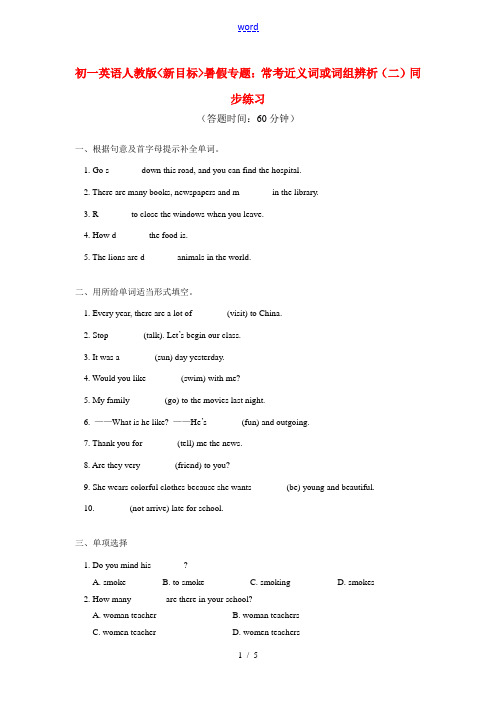
初一英语人教版<新目标>暑假专题:常考近义词或词组辨析(二)同步练习(答题时间:60分钟)一、根据句意及首字母提示补全单词。
1. Go s_______ down this road, and you can find the hospital.2. There are many books, newspapers and m_______ in the library.3. R_______ to close the windows when you leave.4. How d_______ the food is.5. The lions are d_______ animals in the world.二、用所给单词适当形式填空。
1. Every year, there are a lot of _______ (visit) to China.2. Stop _______ (talk). Let’s begin our class.3. It was a _______ (sun) day yesterday.4. Would you like _______ (swim) with me?5. My family _______ (go) to the movies last night.6. ——What is he like? ——He’s _______ (fun) and outgoing.7. Thank you for _______ (tell) me the news.8. Are they very _______ (friend) to you?9. She wears colorful clothes because she wants _______ (be) young and beautiful.10. _______ (not arrive) late for school.三、单项选择1. Do you mind his _______?A. smokeB. to smokeC. smokingD. smokes2. How many _______ are there in your school?A. woman teacherB. woman teachersC. women teacherD. women teachers3. What _______ it is today!A. a nice weatherB. nice weatherC. nice weathersD. nice a weather4. I was late for class _______ I didn’t get up early.A. butB. andC. becauseD. or5. Mike, _______ in bed.A. not readB. doesn’t readC. no readingD. don’t read6. I found _______ in the next room.A. him singingB. his singingC. he singD. he singing7. I have _______ to tell him.A. something interestingB. interesting somethingC. anything interestingD. interesting anything8. The apples are _______ high. I can’t reach them.A. too manyB. too muchC. many tooD. much too9. He has to be in bed _______ ten o’clock.A. byB. forC. onD. in10. Don’t go out _______ windy nights.A. inB. atC. onD. by四、改写句子1. I’m short and thin (对划线部分提问)_______ _______ you _______ _______ ?2. What do you think of Culture Beijing?(改为同义句)_______ _______ you _______ Culture Beijing?3. Children are playing games in the garden.(对划线部分提问)_______ _______ the children _______ in the garden?4. Could you please not close the window?(改为祈使句)_______ _______ the window, please.5. Lucy has to look after her brother after school. (对划线部分提问)_______ _______ Lucy _______ to _______ after school?五、完形填空Mothers’ Day is on the ____1____ Sunday in May every year. This year it’s on May 8th. It’s ____2____ a holiday in some other ____3____. It is a day to ____4____ mothers. On that day, mothers usually ____5____ flowers and cards. On cards children often ____6____ “Thanks mum”“To the ____7____ mother in the world.”“Best wishes ____8____ Mothers’ Day.”“Thank you for making me ____9____,” and so on. Some families often go out and try to do ____10____ for their mothers. It’s a good day to let your mum take a rest. What are you going to do for your mother next year?1. A. two B. three C. second D. fourth2. A. also B. like C. too D. as3. A. town B. village C. city D. countries4. A. love B. help C. celebrate D. thank5. A. give B. get C. keep D. buy6. A. say B. write C. wish D. give7. A. good B. best C. better D. nice8. A. for B. to C. with D. on9. A. happy B. free C. sad D. busy10. A. nice something B. anything niceC. something niceD. nice nothing六、阅读理解Most people have jobs. Some people are lucky(幸运的), and they make lots of money. But some are not. They don’t like their jobs because they make a little money. The best jobs are often very difficult. People take a long time to learn how to do them. Doctors have to go on(继续)studying for six years after finishing school.Some young people have interesting jobs and they get lots of money. Soccer and tennis stars are usually under 35 years old. Older(更大岁数的)people usually cannot play these sports verywell.A lot of people read the newspaper ads, because they want to find better jobs or get new jobs.1. A doctor studies for _________ years after finishing school.A. thirty-fiveB. sixC. more than six2. Soccer and tennis stars are usually _________.A. older peopleB. 35 years oldC. young people3. A famous(著名的)tennis star can make _________ money.A. a littleB. manyC. a lot of4. If a man doesn’t have a job, he may _________.A. learn how to be luckyB. watch soccer or tennisC. read the newspaper ads5. From the passage(短文), we know _________.A. the best jobs are usually very easyB. old people can also play soccer and tennis very wellC. some young people have good jobs and make much money七、任务型阅读The summer vacation is the best part of the year for most American children. The weather is usually good, so they can have a good time outdoors. If one lives in the countryside he or she may have fun playing in the woods(树林)or fields. If one lives in a city, he or she likes to go to a park to play.Tom, an American boy, enjoys traveling very much. He always travels in his country. This summer, he wants to do something different. He is interested in Chinese history. So he is going to Beijing and Xi’an by plane. He is leaving on the 15th of July and getting back to New York on the last day of the month. He plans to have a fantastic vacation. During the day, he is visiting places of interest and shopping. At night, he is talking walks to enjoy night views. He’s sure he’ll have a wonderful vacation.根据短文内容补全句子:1. Tom es from _________.2. Children in the _________ like to play in the park.3. The weather in summer is usually _________.4. This summer, Tom is going to _________ on vacation.5. Tom is going back home on _________ 31st.【试题答案】一、1. straight 2. magazines 3. Remember 4. delicious 5. dangerous二、1. visitors 2. talking 3. sunny 4. to swim 5. went 6. funny7. telling 8. friendly 9. to be 10. Don’t arrive三、1~5 CDBCD 6~10 AADAC四、1. What do look like 2. How do like 3. What are doing4. Don’t close5. What does have do五、1~5 CADDB 6~10 BBAAC六、BCCBC七、1. America/ the USA 2. city 3. good/ fine 4. China 5. July。
暑假作业15词汇辨析(原卷版)

作业15 词汇辨析一、人教版七年级下册U1词汇辨析:参加辨析例句join 指加入某个党派,团体组织等,强调成为其成员之一,意为:“参军、入团、入党”等He joined the party in 2000.Bob wants to join the music club.Bob想要加入音乐俱乐部。
join in= take part in指参加会议或群众性活动等He wants to_______ the game. They took part in the meeting . We all took part in the discussion.说辨析例句speak强调说的语言speak English/Chinese/French说英语/中文/法文say强调说的内容Can you say hello to him?你可以向他问好吗? tell告诉转述(故事,笑话)I want to _______. 我想给你讲一个故事。
talk talk to sb(强调一方在说)talk with sb (强调双方都在说)I want to talk to/with you about the matter.我想和你谈论一下那个问题。
二、人教版七年级下册U2词汇辨析:含义例句sometimes有时候I sometimes go to school by bike.我有时骑自行车上学some times_______I have been to Beijing three times.我去过北京三次sometime某时(过去或将来的某时间) I will live on the moon sometime.有一天我会住在月亮上some time一段时间He will stay in Changsha for some time.含义job可数名词;强调某份职业He has an interesting job. 他有一份有趣的工作。
人教版七上近义词辨析
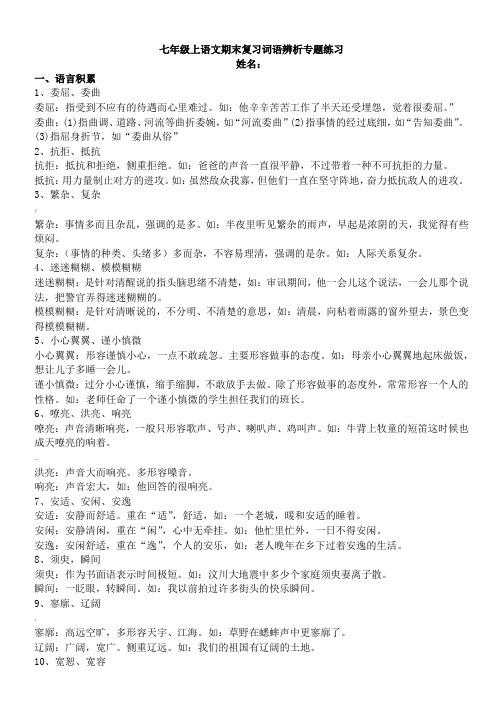
七年级上语文期末复习词语辨析专题练习姓名:一、语言积累1、委屈、委曲委屈:指受到不应有的待遇而心里难过。
如:他辛辛苦苦工作了半天还受埋怨,觉着很委屈。
”委曲:(1)指曲调、道路、河流等曲折委婉,如“河流委曲”(2)指事情的经过底细,如“告知委曲”。
(3)指屈身折节,如“委曲从俗”2、抗拒、抵抗抗拒:抵抗和拒绝,侧重拒绝。
如:爸爸的声音一直很平静,不过带着一种不可抗拒的力量。
抵抗:用力量制止对方的进攻。
如:虽然敌众我寡,但他们一直在坚守阵地,奋力抵抗敌人的进攻。
3、繁杂、复杂?繁杂:事情多而且杂乱,强调的是多。
如:半夜里听见繁杂的雨声,早起是浓阴的天,我觉得有些烦闷。
复杂:(事情的种类、头绪多)多而杂,不容易理清,强调的是杂。
如:人际关系复杂。
4、迷迷糊糊、模模糊糊迷迷糊糊:是针对清醒说的指头脑思绪不清楚,如:审讯期间,他一会儿这个说法,一会儿那个说法,把警官弄得迷迷糊糊的。
模模糊糊:是针对清晰说的,不分明、不清楚的意思,如:清晨,向粘着雨露的窗外望去,景色变得模模糊糊。
5、小心翼翼、谨小慎微小心翼翼:形容谨慎小心,一点不敢疏忽。
主要形容做事的态度。
如:母亲小心翼翼地起床做饭,想让儿子多睡一会儿。
谨小慎微:过分小心谨慎,缩手缩脚,不敢放手去做。
除了形容做事的态度外,常常形容一个人的性格。
如:老师任命了一个谨小慎微的学生担任我们的班长。
6、嘹亮、洪亮、响亮嘹亮:声音清晰响亮,一般只形容歌声、号声、喇叭声、鸡叫声。
如:牛背上牧童的短笛这时候也成天嘹亮的响着。
—洪亮:声音大而响亮。
多形容嗓音。
响亮:声音宏大,如:他回答的很响亮。
7、安适、安闲、安逸安适:安静而舒适。
重在“适”,舒适,如:一个老城,暖和安适的睡着。
安闲:安静清闲,重在“闲”,心中无牵挂。
如:他忙里忙外,一日不得安闲。
安逸:安闲舒适,重在“逸”,个人的安乐,如:老人晚年在乡下过着安逸的生活。
8、须臾,瞬间须臾:作为书面语表示时间极短。
如:汶川大地震中多少个家庭须臾妻离子散。
暑假专题——七年级常考近义词或词组辨析同步练习
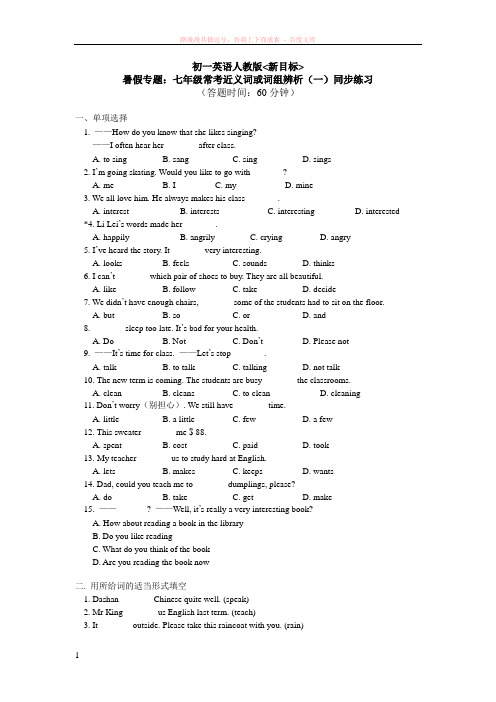
初一英语人教版<新目标>暑假专题:七年级常考近义词或词组辨析(一)同步练习(答题时间:60分钟)一、单项选择1. ——How do you know that she likes singing?——I often hear her _______ after class.A. to singB. sangC. singD. sings2. I’m going skating. Would you like to go with _______?A. meB. IC. myD. mine3. We all love him. He always makes his class _______.A. interestB. interestsC. interestingD. interested *4. Li Lei’s words made her _______.A. happilyB. angrilyC. cryingD. angry5. I’ve heard the story. It _______ very interesting.A. looksB. feelsC. soundsD. thinks6. I can’t _______ which pair of shoes to buy. They are all beautiful.A. likeB. followC. takeD. decide7. We didn’t have enough chairs, _______ some of the students had to sit on the floor.A. butB. soC. orD. and8. _______ sleep too late. It’s bad for your health.A. DoB. NotC. Don’tD. Please not9. ——It’s time for class. ——Let’s stop _______.A. talkB. to talkC. talkingD. not talk10. The new term is coming. The students are busy _______ the classrooms.A. cleanB. cleansC. to cleanD. cleaning11. Don’t worry(别担心). We still have _______ time.A. littleB. a littleC. fewD. a few12. This sweater _______ me $ 88.A. spentB. costC. paidD. took13. My teacher _______ us to study hard at English.A. letsB. makesC. keepsD. wants14. Dad, could you teach me to _______ dumplings, please?A. doB. takeC. getD. make15. ——_______? ——Well, it’s really a very interesting book?A. How about reading a book in the libraryB. Do you like readingC. What do you think of the bookD. Are you reading the book now二. 用所给词的适当形式填空1. Dashan _______ Chinese quite well. (speak)2. Mr King _______ us English last term. (teach)3. It _______ outside. Please take this raincoat with you. (rain)4. Who _______ to the beach last weekend? (go)5. I did some _______ at the library on Tuesday. (read)6. I am always busy. What about _______ (she)?7. I think these backpacks are _______. (child)8. ——Can you help me with my Chinese? ——I’m sorry, I can’t.I can help you _______. (late)9. I want to wear my _______ shoes. (sport)10. She is in the _______ hall. She is having lunch there. (dine)三. 句型转换1. You can put the book on the table. (改为否定祈使句)_______ _______ the book on the table.2. My sister often helps me with my English. (同义句)My sister often helps me _______ English.3. At home we must finish our homework. (同义句)At home we _______ _______ finish our homework.*4. He spent a whole morning cleaning the room. (对划线部分提问)_______ _______ _______ he _______ cleaning the room?5. I won’t go with my brother. He thinks. (合并成一个复合句)He _______ _______ I _______ go with my brother.四、完形填空Doctor Brown is always busy at work. But next month he is going to take ___1___. He is going to China with his wife. The Browns have heard the ___2___ saying, “The man who doesn't reach the Great Wall is not a true man.” ___3___ they are going to Beijing, the heart of China, to visit the Great Wall. They are ___4___ in Beijing for about a week. They have ___5___ Chinese friends there, so they will visit them. Then they are leaving ___6___ Hangzhou to see the West Lake by plane. They are going fishing there. They ___7___ to stay there for about half a week. Dr Brown is ___8___ at the top of the Yellow Mountain in his dream. Eventually (终于) he has the chance to have a look at it. So next they're going to Anhui by train and going ___9___ in the great mountain.After five or six days in AnHui, they’ll have to go back to London and have a good ___10___, for about a week before they go on with three work.1. A. a long vacationB. a short vacationC. an important meetingD. an exciting party2. A. funny B. boring C. famous D. expensive3. A. But B. So C. And D. Because4. A. keeping B. living C. flying D. staying5. A. a kind B. a little C. a few D. a lot6. A. from B. in C. to D. for7. A. plan B. say C. keep D. try8. A. always B. now C. hardly D. early9. A. running B. hiking C. shopping D. fishing10. A. fun B. look C. rest D. meal五. 阅读理解We are all learning English, but how can we learn English well? A student can know a lot about English, but maybe(可能) he can't speak English.If you want to know how to swim, you must get into the river. And if you want to be a football player, you must play football.So, you see, you can learn English only by using it. You must listen to your teacher in class. You must study your lessons every day. You must speak English to your classmates and also you must write something sometimes. Then one day, you may find your English very good.1. You know a lot about English but maybe you____.A. can speak itB. can study itC. can't study itD. can't use it2. If you want to learn to swim you should _______.A. get into the riverB. read books about swimmingC. learn from other people firstD. play football well first3. If you want to be a football player, you should _______.A. buy a good footballB. practice footballC. watch others play footballD. put your football away4. The story of learning swimming and playing football tells us _______.A. we learn English by using itB. swimming needs waterC. playing football is easyD. learning English is difficult5. If you want to study English well, you must often _______.A. speak EnglishB. write in EnglishC. listen to EnglishD. All of the above.六、任务型阅读Good health is very important for us. If we don’t have good health, how can we work hard? And if we can’t work hard, how can we succeed(成功)and how can we be happy? Money can do many things and make one enjoy the world in many ways, but it has no meaning to one who is not in good health.A number of useful rules can do much to make good health, if we follow them.Firstly, we must take food at regular time and never too much.Secondly, keep our rooms airy(通风的). Fresh air is good for health, and also we must always keep our body clean, cleanliness keeps sickness away.Thirdly, we must have enough sleep, late to bed and late to rise(起)will ruin(损坏)ourhealth. So we must have exercises. Exercises make our muscles(肌肉)strong and protect(预防)ourselves against illness.Finally, there is one important thing to do: work. Making ourselves busy at work helps much in keeping good health. Lazy (懒惰)people can never enjoy good health and can never succeed and be happy.1~2判断对错,3翻译成汉语,4回答问题,5选择1. We need enough sleep, so late to rise is good for our health.2. Doing sports can make us healthy.3. 翻译文中划线部分.4. What is important for us?5. What’s the main idea of this passage?A. Money can do many thingsB. Exercise can make us healthy.C. How to make good health.D. Fresh air is good for health.【试题答案】一. 1~5 CACDC 6~10 DBCCD 11~15 BBDDC二. 1. speaks 2. taught 3. is raining 4. went 5. reading 6. her7. children’s 8. later 9. sports 10. dinning三. 1. Don’t put 2. learn 3. have to 4. How long did, spend5. doesn’t think, will四. 1~5 ACBDC 6~10 DAABC五. DABAD六. 1. F 2. T 3. 在工作时,使我们自己繁忙对我们保持健康帮助很大。
近义词辨析练习题

近义词辨析练习题一、目标/目的在日常写作中,我们常常遇到需要用到近义词的情况。
准确地选择适合的近义词可以丰富文章表达,增加句子的变化和层次感。
然而,由于近义词之间的微妙差别,选择合适的词语也是一项挑战。
本文将介绍一些常见的近义词,并提供一些辨析练习题,帮助读者更好地掌握它们的用法。
二、低调/谦逊/谨慎1. 谦逊:指一个人言词谦和、态度谦虚。
强调的是对他人的尊重和自己的谦虚,是对自己的评价进行抑制。
2. 谨慎:指一个人做事认真、小心谨慎。
强调的是对事物处理的周密和细致,是对风险的分析和难题的处理。
练习题:1. 从小事做起,每个人都应该______地对待生活中各种各样的问题。
2. 在面对挑战时,他总是______地沉思后才做出决策。
参考答案:1. 谦逊2. 谨慎三、平凡/普通/一般1. 平凡:指某人或某事的特点、能力、价值普通、寻常,没有太大的特色或闪光点。
2. 普通:形容某人或某物在同类中不突出,与其他相似的事物无太大差别。
3. 一般:指事物在性质、品质等方面与同类事物相类似,没有太大的特殊性。
练习题:1. 这个剧的剧情非常______,缺少惊喜和创新元素。
2. 她是一个非常______的学生,没有出色的成绩,但也不会有太差的表现。
参考答案:1. 平凡2. 普通四、充实/丰富/丰满1. 充实:形容内容多,内涵丰富,令人满意。
2. 丰富:指数量多,种类多样,质量高。
3. 丰满:形容事物充盈、充足、内容充实,具有饱满的状态。
练习题:1. 这本书的内容非常______,读后让我受益匪浅。
2. 这个城市非常______,有许多博物馆、剧院和历史遗迹。
3. 她的脸庞非常______,线条柔和而富有弹性。
参考答案:1. 充实2. 丰富3. 丰满五、挑剔/苛刻/吹毛求疵1. 挑剔:形容对事物要求很高,对小细节有极高的要求。
2. 苛刻:指对人或事物的要求严格,对待问题缺乏宽容。
3. 吹毛求疵:指对事物的问题和缺陷挑剔过分,不容易满足。
初一英语同义词.近义词辨析(一)综合练习.doc

35分钟)A. bringB. takeC. canyD. get ( )19. They a wonderful basketball game last night. A.seen B. watched C. looked D. looked at a word at all. A. look at B. look for C. find D. find out (答题时间: 初一英语同义词.近义词辨析(一)综合练习( )1. —Did you ________ your ticket, sir?一No, Fm still _____ it.A. find; findingB. look for; looking forC. find; looking for D ・ look for; finding ( )2.1have many interesting books to ___________________ .A. seeB. look atC. watchD. read()**3・ Trucks ____ all kinds of things here and there ・ A. cany B. take C. bring D ・ get ()4. Can they _____ about it in English? A. spoke B. talk C. say D. told ()5.1 bought some CDs for my friend and they __________ me 30 yuan ・ A. spent B. paid C. cost D. took ()6. Fm afraid it will __________ you much time to work out the problem. A ・ spend B ・ take C ・ cost D ・ pay ()7. Every day, I spend two hours ________ my homework ・ A. finishing B ・ finish C. to finish D. finished ()The Green family __________ Xiamen last Sunday morning ・ A. came B ・ arrived C ・ reached to D. got to ()9. There ________ two children and a woman swimming at the pool yesterday. A. is B ・ are C ・ was D. were ()*10. He can" ______ English, so I have to ______ it in Chinese. A ・ talk; speak B. speak; tell C ・ say; talk D ・ speak; say ( )*11. The boy can ?t _______ French or German. So I ______ with him in English.A. speak; talkB. speak; sayC. talk; tell D ・ tell; talk ( )*12. My mother , "I want to you astory in English 二A. says; talk B ・ speaks; tell C ・ says; tell D ・ talks; say ( )**13. His family all at home.A. is B ・ am C ・ are D. be( )14. My father is looking for a _________ these days.A. jobB. workC. jobsD. works( )*15. This sweater ________ me $ 50.A. spentB. costC. paidD. took( )*16.—How do you know that she likes singing?——I often hear her _____ after class.A ・ to sing B. sang C ・ sing D ・ sings( )17・ How long does it _____ you to walk to school every day?A ・ takeB ・ pay C. spend D. cost( )*18. Don't forget to _____ me your photos here tomorrow ・)20. He ____ carefully, but he couldn'tA. listened; listened to B ・ listened; heard C ・ heard; listen to D ・ 1 istened; hear ()21.Whereas my book? I can't ______________ it.( )**22. What would you like to _________ about your hometown?A. speakB. talkC. sayD. tell( )**23・ What would you like to _____ us about your hometown?A. speakB. talkC. sayD. tell( )**24. Please write to me as soon as you _________ Shanghai.A. aiTive B・ reach C. got to D. come( )25.1 didn't take it, it _____ too much.A. paidB. tookC. costD. spent同义句转换1 ・ The boy spent five hours finishing his homework・It _____ the boy five hours ____________ his homework・2.That new dictionary cost him ten yuan・__________ ten yuan for that new dictionary.**3.1 want to look for a job in the city.I want to look for _________________ w ork in the city.*4. His family has five people・_________ five people in his family・5. They got to America last night.They ___________ A merica last night.天行健,君子以自强不息.《易经》初一英语同义词、近义词辨析(一)综合练习参考答案I . 1-5 CDABC 6-10 BADDD 11-15 ACCAB 16-20 CAABD 21 -25 CCDBC思路分析:3.浏览各选项可知caiTy指用人力或交通工具“把带到”,无方向性;take指从这里把某人或某物带走。
- 1、下载文档前请自行甄别文档内容的完整性,平台不提供额外的编辑、内容补充、找答案等附加服务。
- 2、"仅部分预览"的文档,不可在线预览部分如存在完整性等问题,可反馈申请退款(可完整预览的文档不适用该条件!)。
- 3、如文档侵犯您的权益,请联系客服反馈,我们会尽快为您处理(人工客服工作时间:9:00-18:30)。
初一英语人教版<新目标>暑假专题:七年级常考近义词或词组辨析(一)同步练习(答题时间:60分钟)一、单项选择1. ——How do you know that she likes singing?——I often hear her _______ after class.A. to singB. sangC. singD. sings2. I’m going skating. Would you like to go with _______?A. meB. IC. myD. mine3. We all love him. He always makes his class _______.A. interestB. interestsC. interestingD. interested *4. Li Lei’s words made her _______.A. happilyB. angrilyC. cryingD. angry5. I’ve heard the story. It _______ very interesting.A. looksB. feelsC. soundsD. thinks6. I can’t _______ which pair of shoes to buy. They are all beautiful.A. likeB. followC. takeD. decide7. We didn’t have enough chairs, _______ some of the students had to sit on the floor.A. butB. soC. orD. and8. _______ sleep too late. It’s bad for your health.A. DoB. NotC. Don’tD. Please not9. ——It’s time for class. ——Let’s stop _______.A. talkB. to talkC. talkingD. not talk10. The new term is coming. The students are busy _______ the classrooms.A. cleanB. cleansC. to cleanD. cleaning11. Don’t worry(别担心). We still have _______ time.A. littleB. a littleC. fewD. a few12. This sweater _______ me $ 88.A. spentB. costC. paidD. took13. My teacher _______ us to study hard at English.A. letsB. makesC. keepsD. wants14. Dad, could you teach me to _______ dumplings, please?A. doB. takeC. getD. make15. ——_______? ——Well, it’s really a very interesting book?A. How about reading a book in the libraryB. Do you like readingC. What do you think of the bookD. Are you reading the book now二. 用所给词的适当形式填空1. Dashan _______ Chinese quite well. (speak)2. Mr King _______ us English last term. (teach)3. It _______ outside. Please take this raincoat with you. (rain)4. Who _______ to the beach last weekend? (go)5. I did some _______ at the library on Tuesday. (read)6. I am always busy. What about _______ (she)?7. I think these backpacks are _______. (child)8. ——Can you help me with my Chinese? ——I’m sorry, I can’t.I can help you _______. (late)9. I want to wear my _______ shoes. (sport)10. She is in the _______ hall. She is having lunch there. (dine)2. A. funny B. boring C. famous D. expensive3. A. But B. So C. And D. Because4. A. keeping B. living C. flying D. staying5. A. a kind B. a little C. a few D. a lot6. A. from B. in C. to D. for7. A. plan B. say C. keep D. try8. A. always B. now C. hardly D. early9. A. running B. hiking C. shopping D. fishing10. A. fun B. look C. rest D. meal五. 阅读理解We are all learning English, but how can we learn English well? A student can know a lot about English, but maybe(可能) he can't speak English.If you want to know how to swim, you must get into the river. And if you want to be a football player, you must play football.So, you see, you can learn English only by using it. You must listen to your teacher in class. You must study your lessons every day. You must speak English to your classmates and also you must write something sometimes. Then one day, you may find your English very good.1. You know a lot about English but maybe you____.A. can speak itB. can study itC. can't study itD. can't use it2. If you want to learn to swim you should _______.A. get into the riverB. read books about swimmingC. learn from other people firstD. play football well first3. If you want to be a football player, you should _______.A. buy a good footballB. practice footballC. watch others play footballD. put your football away4. The story of learning swimming and playing football tells us _______.A. we learn English by using itB. swimming needs waterC. playing football is easyD. learning English is difficult5. If you want to study English well, you must often _______.A. speak EnglishB. write in EnglishC. listen to EnglishD. All of the above.六、任务型阅读Good health is very important for us. If we don’t have good health, how can we work hard? And if we can’t work hard, how can we succeed(成功)and how can we be happy? Money can do many things and make one enjoy the world in many ways, but it has no meaning to one who is not in good health.A number of useful rules can do much to make good health, if we follow them.Firstly, we must take food at regular time and never too much.Secondly, keep our rooms airy(通风的). Fresh air is good for health, and also we must always keep our body clean, cleanliness keeps sickness away.Thirdly, we must have enough sleep, late to bed and late to rise(起)will ruin(损坏)our health. So we must have exercises. Exercises make our muscles(肌肉)strong and protect(预防)ourselves against illness.Finally, there is one important thing to do: work. Making ourselves busy at work helps much in keeping good health. Lazy (懒惰)people can never enjoy good health and can never succeed and be happy.1~2判断对错,3翻译成汉语,4回答问题,5选择1. We need enough sleep, so late to rise is good for our health.2. Doing sports can make us healthy.3. 翻译文中划线部分.4. What is important for us?5. What’s the main idea of this passage?A. Money can do many thingsB. Exercise can make us healthy.C. How to make good health.D. Fresh air is good for health.【试题答案】一. 1~5 CACDC 6~10 DBCCD 11~15 BBDDC二. 1. speaks 2. taught 3. is raining 4. went 5. reading 6. her7. children’s 8. later 9. sports 10. dinning三. 1. Don’t put 2. learn 3. have to 4. How long did, spend5. doesn’t think, will四. 1~5 ACBDC 6~10 DAABC五. DABAD六. 1. F 2. T 3. 在工作时,使我们自己繁忙对我们保持健康帮助很大。
